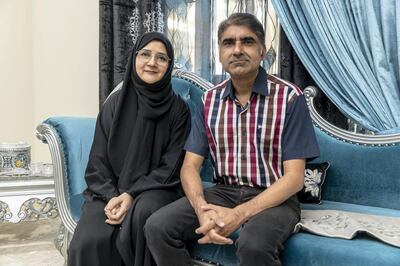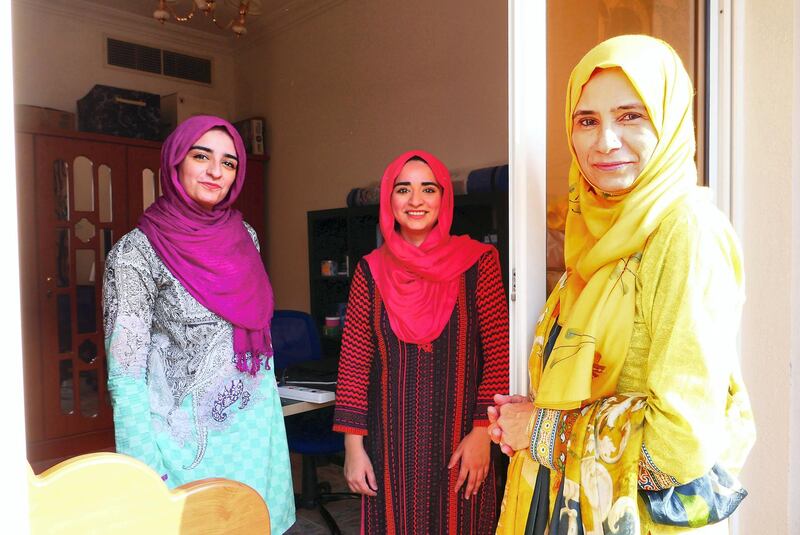The day her older daughter contracted Covid-19, Dubai resident, Najma Kolsawala, 58, panicked, naturally. Four days later, her younger daughter, Neha, 28, also fell ill and both girls had to be quarantined at home.
For a mother and an untrained yet primary caregiver to the sick family, the phase was akin to her world coming crashing down.
"I can't describe in words the mental anguish I was going through," she tells The National. "I couldn't see them, I couldn't touch them or help them in any way."
Both Neha and her elder sister, Jawahir, are doctors at a Dubai hospital. Last year, when the pandemic broke out, both volunteered to work on the frontline in the Covid-19 isolation ward. For three months, the girls did not come home and this put a lot of mental stress on Kolsawala, a teacher, but eventually she and her husband got used to the routine.
“They did not fall ill at that time and that was a relief, but when both contracted Covid, it put me under so much stress that I could not sleep at night,” she says. “I would constantly go over to our shared balcony and peep into their room to make sure they were OK.”
Neha says that while the fear of contracting the coronavirus at work was real, there was the additional stress of not being able to come home to her elderly parents.
“It was a difficult time and very stressful because we are young and could be asymptomatic and unknowingly pass on the virus to our parents. Things were very heartbreaking at that time.”
The sisters say that they overcame the mental stress by being there for each other.
“We kept telling each other that this was the best way forward and we had conversations among us that we would soon overcome this,” Neha says.
Unfortunately, while the sisters were quarantining, their mum was isolated in her grief and fear.
Caregivers face their own demons

According to experts, the stress and challenges that family caregivers go through can have a huge impact on their mental health, leading them to experience depression, anxiety and post-traumatic stress disorder.
“They have to balance caring for their dear ones and, at the same time, they are concerned about their well-being, which leads to increased anxiety that manifests in physiological symptoms such as palpitations, headaches, chest tightness, among others,” says Dr Marina Joseph, a clinical psychologist at Zulekha Hospital in Sharjah.
A study conducted in the UK last October confirmed that Covid-19 has had a negative impact on family caregivers’ mental health with loneliness being a significant contributor to depressive symptomatology.
“However, despite these detriments in mental health, the majority of caregivers do not access any psychiatric support online or via the phone. Psychiatric services and healthcare professionals should aim to focus on reducing feelings of loneliness to support at-risk caregivers,” the study said.
It is imperative, then, that caregivers take care of themselves – both physically and mentally – not only for their own well-being, but also to be able to continue to be a source of support for their loved ones.
The question is: how?
Food, exercise and sleep are imperative for caregivers
For Sadaf Ather, a homemaker from Dubai, the only way to lessen her anxiety when her husband and daughter, Shahzeen, 18, caught Covid was to connect with them through Zoom while they were isolated.
Her daughter’s illness hit Ather particularly hard.
“Whenever my daughter was unwell as a child, I used to stay up all night to tend to her and now, when she was very ill and had to isolate, I couldn’t even go near her,” she says. “For my satisfaction, I would ask my daughter to open the door of her room and show me her face.”
Ather says the helplessness and frustration of not being able to do anything for her family affected her to the point that she was sleepless and anxious for the entire time they were quarantined.
There was also a strict diet regimen to be followed, which kept her on her toes. “I was constantly thinking about them,” says Ather.
Ather’s elderly mother who lives close by was, in turn, worried for her daughter and her daughter’s family.
“I was also quarantining and didn’t want to go and meet her for fear of exposing her to the virus. So there was a constant cycle of worrying at our house,” Ather says.
During the time their families were ailing, Kolsawala and Ather both lost weight from lack of sleep and constant worrying, which, according to Joseph, is a physical manifestation of stress.
“Loss of appetite is linked with depression and the person doesn’t feel like eating when they are in social isolation, or are lonely or sad,” she says.
To beat the blues, Ather bought books for the quarantined duo and asked them to think positive and keep praying.
Some other important steps a caregiver can take to improve their mental health are: taking enough rest, eating healthy, exercising or engaging in a physical activity, performing relaxation exercises such as yoga, following sleep hygiene, staying in contact with friends, taking a break from social media, talking to a trusted friend or seeking professional help if none of these make you feel better.
Getting help
Last year, the UAE Ministry of Health and Prevention, launched an online National Programme for Happiness and Wellbeing to help people overcome the possible psychological impact of the pandemic. The campaign involves counselling through recorded videos that are posted on the programme’s social media accounts and promoted with the hashtag #DontWorry.
The Ministry encourages people to post questions and pick up tips to overcome any challenges they might be facing under such circumstances. They can also connect to virtual support groups that the programme provides in partnership with more than 50 experts in the fields of psychology, mental and social support and life skills.
A dedicated hotline (04 519 2519) has also been set up for residents if they need support for psychological concerns and anxiety related to Covid19. It works 9am to 9pm, from Sunday to Thursday. Alternatively, they can email alamal.consultations@mohop.gov.ae.







